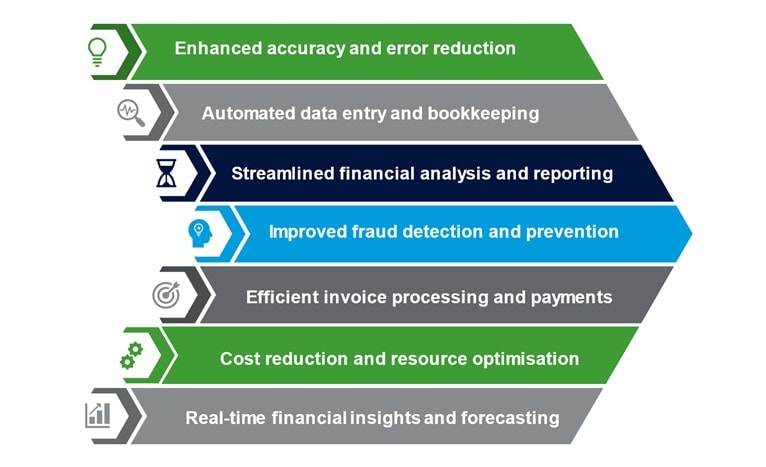Understand the new technological trends shaping the future of audit profession
The auditing profession has been experiencing a significant change over the years driven by technological advancements and the use of Artificial Intelligence within the audit process. These innovations have led to improvements in accuracy, efficiency, and strategic value of an audit. It has become necessary to understand these new technological trends that are shaping the future of the audit profession and how to take advantage of these innovations effectively.
Below will identify the current technology trends shaping the future of auditing, highlighting how these innovations are transforming the field and what auditors can do to stay ahead.
Artificial Intelligence (AI) and Machine Learning
Advancements in AI and machine learning, including the development of large language models (LLMs) tailored to specific industries, are significantly impacting the auditing process. These technologies will enhance the accuracy and efficiency of audits by providing deeper insights and automating complex tasks. For example, AI-powered algorithms can analyse financial transactions to detect anomalies or patterns indicative of fraudulent activities, enabling auditors to focus their efforts on high-risk areas. Machine learning models can also learn from past audit experiences to improve audit planning and execution, ultimately enhancing audit quality and efficiency.
Robotic Process Automation (RPA)
Robotic Process Automation (RPA) is another transformative technology within the audit process and has advantages in driving efficiency. By automating repetitive tasks such as data entry, reconciliation and report generation, RPA allows auditors to reallocate their time and resources to more value-added activities, such as data analysis and strategic decision-making. Furthermore, RPA enhances audit consistency and accuracy by reducing the risk of human error and ensuring compliance with audit standards and regulations. As auditors increasingly embrace RPA, they are ready to deliver higher-quality audits and provide greater value to clients and stakeholders.
Data Analytics
Data analytics, including predictive analytics, play a crucial role in the current audit profession. Advanced data analysis algorithms can analyse data to identify patterns, anomalies and trends that may indicate fraud or errors. Predictive analytics, for example, can predict future risks based on historical data, allowing auditors to focus on areas with higher risk. These tools will not only help auditors assess risks but also identify material misstatements and improve the overall speed of an audit. By using data analytics, auditors can provide more meaningful insights to clients and stakeholders. This technology will therefore reduce the risk of fraud and enhances trust in financial reporting.
Continuous Auditing and Monitoring
Continuous auditing and monitoring have emerged as essential strategies for enhancing audit quality. Unlike traditional periodic audits, continuous auditing employs automated tools and real-time data to monitor key financial and operational data on an ongoing basis. This proactive approach enables auditors to detect anomalies, errors or frauds in a timely manner and take corrective actions as needed. Furthermore, continuous monitoring allows auditors to provide stakeholders with more accurate and up-to-date information, thereby enhancing transparency and trust in the audit process.
Below shows a step approach of the benefits of the upcoming technology innovations.

Below are other important emerging trends to note within the auditing profession:
Environmental, Social, and Governance (ESG) Audits
ESG audits are gaining popularity as stakeholders demand transparency in sustainable and responsible business practices. Auditors are now evaluating companies' environmental impact, social responsibility initiatives and governance structures. As audit firms face increasing pressure to demonstrate their commitment to ESG principles, auditors play a crucial role in verifying the accuracy and reliability of ESG disclosures.
Cybersecurity Audits
With the rise of cybersecurity threats, auditors are now assessing network security and preparing for cyber risks through methods like penetration testing, vulnerability assessments and assessing the overall IT general control environment (ITGC). This represents a significant evolution from traditional auditing and increases the importance of cybersecurity in the audit profession.
Remote Auditing
The auditing profession has seen an accelerated adoption of remote auditing. Utilising virtual tools, auditors can now conduct audits more efficiently and overcome geographical barriers. While physical audits remain essential for certain areas, the ability to perform remote audits allows audit firms to source the best auditors globally.
Quality and Ethics
Maintaining high standards in audit quality and ethics is increasingly important. Regulatory bodies are introducing updated standards to enhance audit reliability. The integration of advanced technologies for quality control and increased transparency with stakeholders are also key trends, ensuring the integrity and accountability of the audit process.
In conclusion, due to these emerging trends and innovations auditors must adapt their skills, processes and methodologies to meet the evolving needs of clients and stakeholders. By taking advantage of AI, RPA, data analytics, continuous auditing and other innovative technologies, they can enhance audit quality, efficiency and effectiveness and ultimately delivering greater value to clients and stakeholders and remain competitive in the profession.
Jason Brown
Assistant Manager: Audit, Johannesburg




